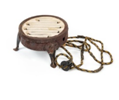Learnings from Rural Maharashtra
We have re-started conducting field demonstrations to promote clean cooking in rural and peri-urban areas. These demonstrations are an effort to connect all aspects of clean cooking together to facilitate wider adoption. Here are our learnings from our recent interaction with folks in a village close to Pune city.
Social Aspects:
During this demonstration we experienced that woman wanted to try most of the improved cookstoves which we presented. However, they were not confident of making the buying decision without their husband or other senior male member of the family.
One woman narrated that her husband insists that she uses firewood for cooking as it was freely available in ample quantity. He has not allowed her to refill the LPG bottle. They have recently shifted to their newly constructed home. She said the kitchen of her new house is already black with soot.
Operational challenges:
Initially women do not feel confident of handling slightly complex or modern looking cookstoves. They are shy of raising their concerns about operations and then device their own ways of using modern cookstoves which might be harmful or inefficient. Eg. They are used to the slow pace cooking with biomass cookstoves which gives them lot of time for preparing ingredients after they lit the cookstove. However, with LPG such behaviour leads to wastage of the fuel. Flame regulation, using right kind of vessel size etc. is unheard of as best practice.
Manufacturers of improved cookstoves do not enough resources for customer education (esp. rural/remote customers) and outreach. During our demonstration we realised that so far this village has been exposed to just these options to choose from – 1) Use the combination costly LPG and firewood, 2) Use only firewood and/or 3) Use illegal electricity for inefficient heating coils. Unfortunately, they are unaware about varieties of improved cookstoves, they haven’t heard of solar, biogas, biochar or pellet-based cooking.
Electric Cooking:
Most households have access to free (read illegal) electricity. They use inefficient induction coil cookstoves (non-standardised) for cooking or water heating whenever electricity is available. We were told that whenever continuous electricity is available, they use the coil cookstove.
Government policy | Impact on ground |
End of Subsidy on Kerosene | Due to unavailability of kerosene people are using single use plastic for igniting firewood cookstoves |
Pradhan Mantri Ujjwala Yojana | All households have LPG connection in this particular village |
LPG price hike | Most people use LPG sparingly. They use firewood mostly for water heating. |
Financial aspects:
Most improved cookstoves range between INR 1800 to INR 5000. Most people can afford these cookstoves but are not able to assign it as a priority spending/investment activity. Selecting a good cookstove and a clean fuel is not part of any discussion as it is not given due importance. Triggering such discussions to assign importance and ownership to clean fuels and clean cookstoves can play a pivotal role in increasing the adoption rates.
Conclusion:
The learnings from this demonstration establish the importance of outreach and customer education in this sector. Whether it is adoption of LPG, Electric cooking, Solar or Biogas fuel, giving the end users an opportunity to choose the best cookstoves after educating them shall help to bring some sustainable impact.
OrjaBox will aims to reach out to 10 village in the coming 8 to 10 months and give them a complete handholding for clean cooking. If you wish to associate with this activity in any capacity then do write to us on [email protected]





To the orjabox.com admin, Your posts are always a great source of information.
I have been surfing on-line more than three hours as of late, yet I by no means found any attention-grabbing article like yours. It’s beautiful price sufficient for me. Personally, if all web owners and bloggers made good content as you did, the net might be much more useful than ever before. “I thank God for my handicaps, for through them, I have found myself, my work and my God.” by Hellen Keller.